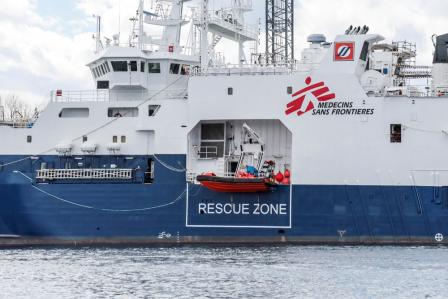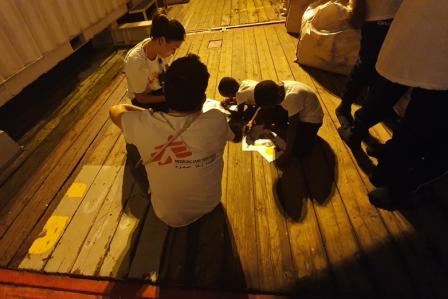Central Mediterranean: almost 400 people rescued in less than two days
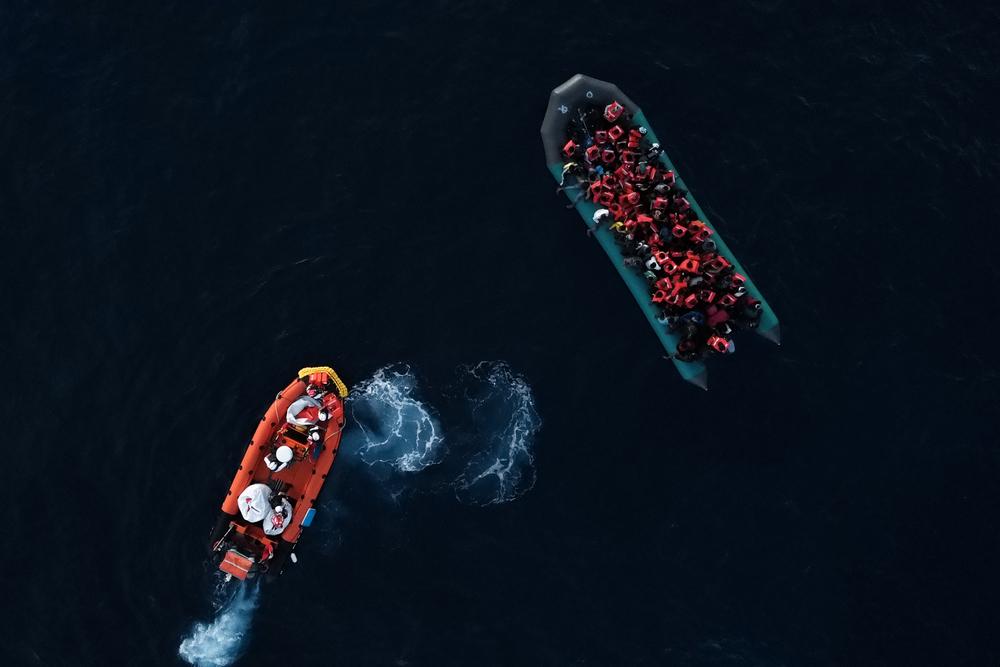
Doctors Without Borders teams arrived on time to carry out the rescue of a rubber boat with 95 people on board safely on the evening of 23rd of October. Mediterranean Sea, 2021. © Filippo Taddei/MSF
“Imagine being on an overcrowded boat without a life vest. Imagine being surrounded by waves up to three meters high while your clothes are soaked, and you are suffering from fuel inhalation. Imagine running out of food and water as time wears on, having no protection from the sun, wind, and rain. Imagine calling for help and no one answers. This is the reality we are witnessing at sea” says Caroline Willemen, Project Coordinator on board Doctors Without Borders' search and rescue ship, the Geo Barents, in the Central Mediterranean.
Amid very harsh weather conditions, Doctors Without Borders / Médecins Sans Frontières (MSF) conducted five challenging rescues. Many of the survivors were hypothermique, after prolonged exposure to the elements or falling in the water. Survivors also faced seasickness and fuel inhalation. Both children and adults have suffered from dehydration and loss of appetite due to seasickness. Among the 367 people on board, 172 are minors, small children and adolescents and 134 of them are unaccompanied.
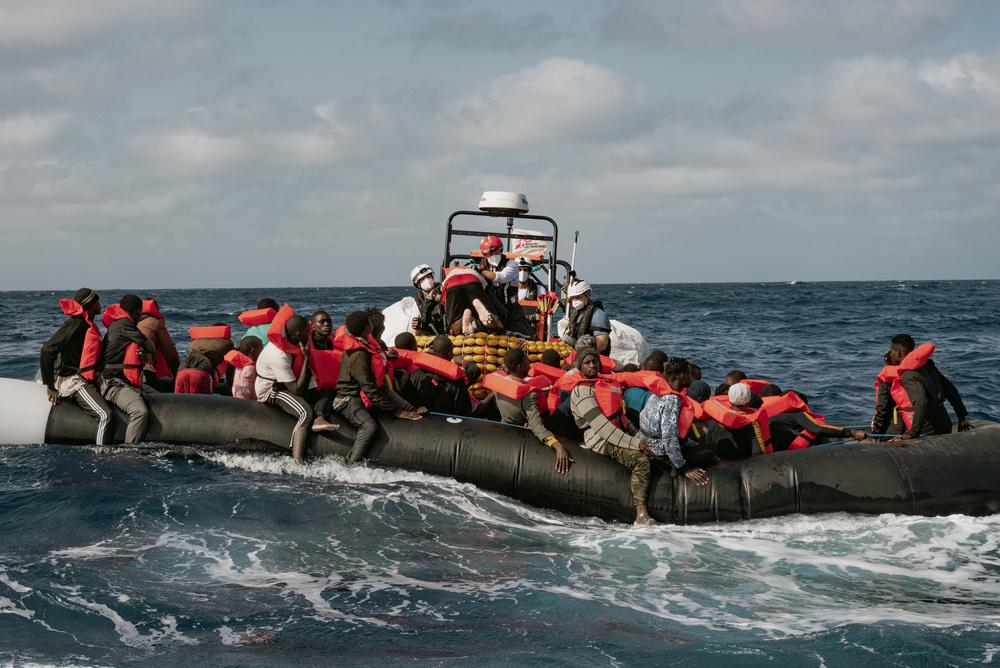
Doctors Without Borders teams rescuing 71 people on the 24th of October. Mediterranean Sea, 2021. © Filippo Taddei/MSF
Critical rescue and fuel intoxication
On the morning of 22 October, Doctors Without Borders teams conducted their first rescue since reaching the search and rescue zone. 36 survivors were brought on board the Geo Barents from a wooden boat. During the rescue operation, the Geo Barents received a new alert. This time, the alert was for a rubber boat in distress, located several hours away.
“We got there at night and it was completely dark. The waves were more than three meters high at one point, and there was a lot of wind. The boat was in a very fragile condition, and the people on board had inhaled fuel fumes and had become agitated due to the difficult situation. Many of the factors that makes a rescue challenging were all there at the same time” explains Leo Southall, Deputy search and rescue team leader on board the Geo Barents.
After roughly two intense hours, the team was able to get all 65 survivors on board. Once safely on the deck of the Geo Barents, many of them expressed their relief and happiness over being rescued, but others were anxious and exhausted after being at sea for more than 24 hours. One of them had to be brought on board on a stretcher, but thankfully recovered quickly.
Ignored by authorities
That same night the Geo Barents received a third alert. Another overcrowded wooden boat was in distress. Although authorities were aware of the situation, no one responded or intervened. It took the Geo Barents nine hours to reach the location of the boat and all this time neither authorities nor other nearby vessels provided assistance.
“This is another clear example of how nearby coastal states are refusing to take any responsibility for people in distress at sea. The boat had been in dangerous waters for three days, with 100 people on board, including 42 children,” recounts Caroline Willemen. “Leaving people to drift at sea for days is unacceptable. Once again, we are witnessing how European migration control policies are endangering lives of thousands of people, by not having any proactive search and rescue capacity at sea and failing to provide a response to all distress calls. It’s unacceptable that NGOs are left to fill the deadly gap,” she continues.
People must not be returned to Libya
By 23 October, Geo Barents had 201 people on board, when it received a new alert of another rubber boat in distress, six hours away from the vessels position. By the time Geo Barents reached the area, the Libyan Coast Guard was already there approaching the rubber boat quickly, maneuvering dangerously around it. Just the day before, Doctors Without Borders team had witnessed an unknown number of migrants and refugees on board of a Libyan Coast Guard vessel, next to an empty boat that was set on fire.
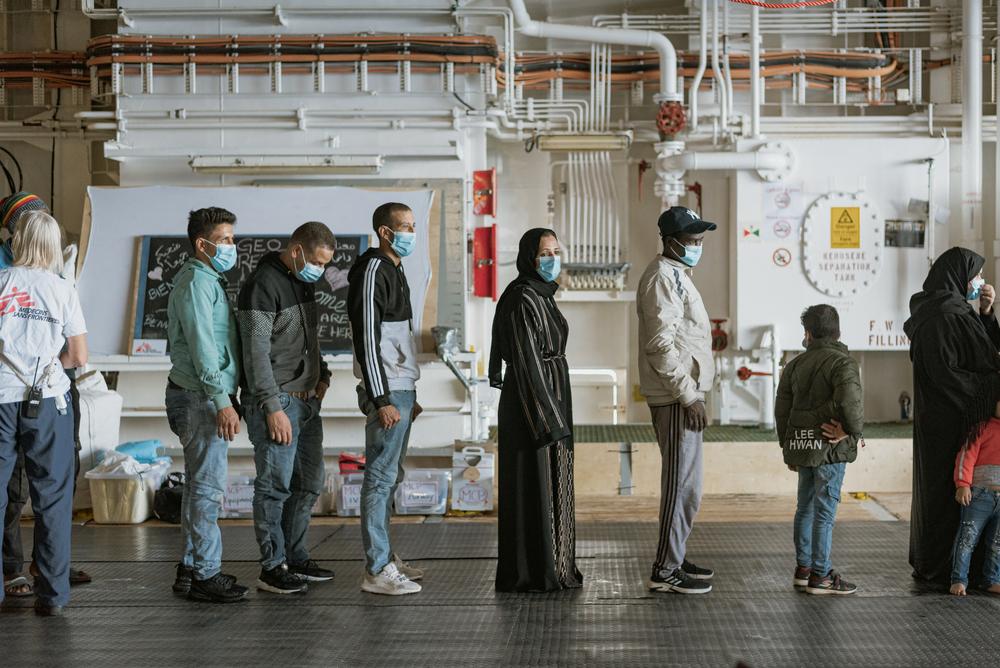
First medical assessment and triage of survivors of the first rescue on the 22nd of October, 2021. Mediterranean Sea, 2021. © Filippo Taddei/MSF
The team on board of the Geo Barents feared then another interception, but this time Doctors Without Borders was able to continue the rescue and bring the 95 survivors on board. Had the Libyan Coast Guard intercepted the vessel the survivors would in all likelihood have been forcibly returned to the cycle of violence and exploitation in Libya.
“European States and institutions must immediately suspend their political and material support to the Libyan Coast Guard and stop the system of forced returns to Libya. Libya is not a safe place”, tells Willemen.
296 people are currently safe and sound onboard the #GeoBarents. Among the survivors, many women and children. #MSF team is providing medical assistance and psychological support.
— MSF Sea (@MSF_Sea) October 24, 2021
©Filippo Taddei/MSF pic.twitter.com/UNZV7GXmRN
Requesting a port of safety
On 24 October, the Doctors Without Borders search and rescue team performed another critical rescue of a rubber boat in distress which was filling up with water. Seventy-one people were on board, extremely scared for their lives. They are all now safe on board of the Geo Barents, which now has 367 people on board in total.
“The last couple of days emphasizes the humanitarian catastrophe that is taking place at the southern border of Europe. With only humanitarian vessels monitoring the world’s deadliest migration route, the need for more search and rescue capacity is desperately needed. We are now calling on Italy to provide a place of safety as soon as possible. Extremely rough forecast are looming and we are very concerned having almost 400 survivors on board who have been through enough at it is. Their suffering must end”, concludes Caroline.
